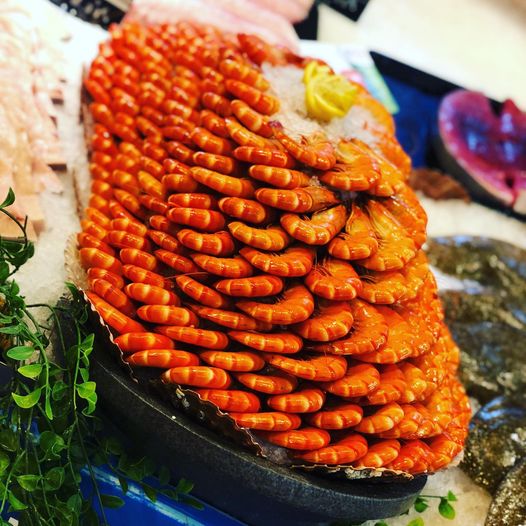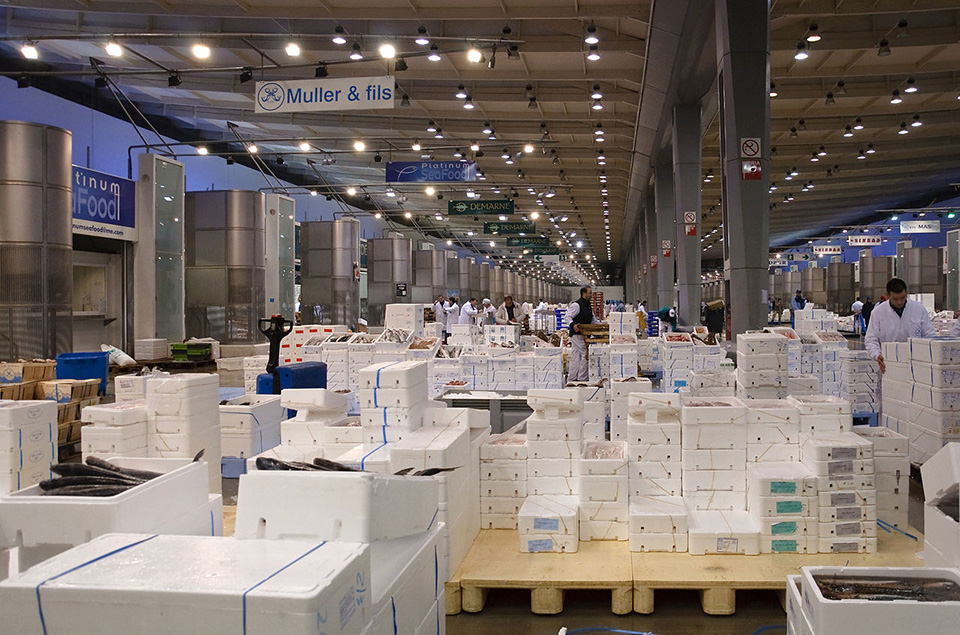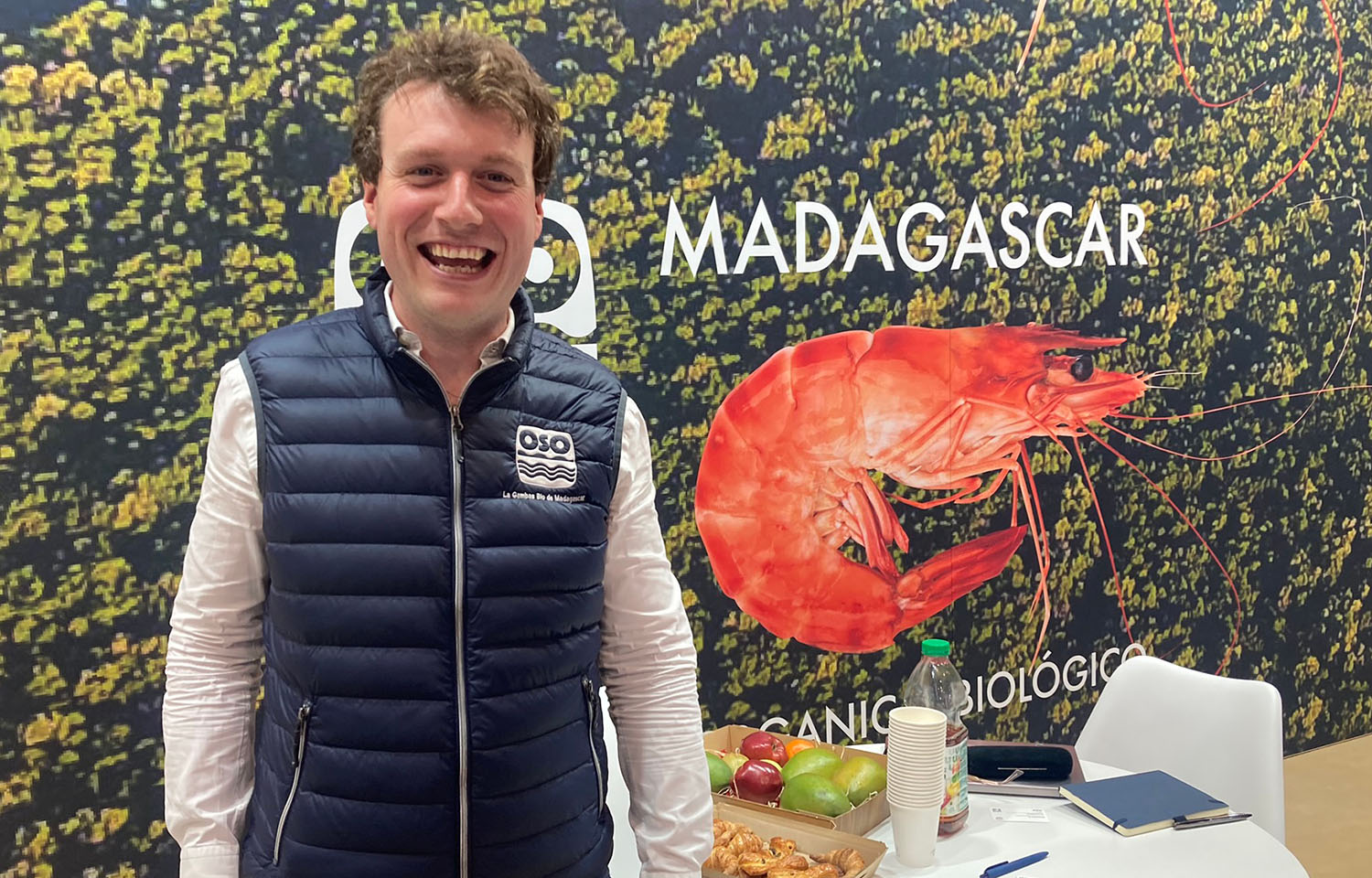At the boutique Bergères market in Puteaux, France, on the outskirts of Paris, OSO’s cooked shrimp are stylishly spread in a position of honor at the stall of Poissonnerie Goube.
Run by owner Jordan Goube, who holds the prestigious title of Meilleur Ouvrier de France, a lifetime award presented by the French Ministry of Labor to master fishmongers, the seafood presented by Poissonnerie Goube to customers is specially selected for its quality.
The OSO shrimp are not cheap at EUR 5.69 (USD 6.25) per 100 grams, but they still sell briskly. One young French couple buying a kilogram of the shrimp said they would serve them cold on top of a fresh baguette for dinner.

“We buy these every week,” Sandhia Sehnert told SeafoodSource in April. “They are so special – firm with a lot of flavor.”
For George Wrigley, OSO’s sales manager of retail and export, being chosen as a featured item by Poissonnerie Goube is both an honor and a business strategy.
With just 1,500 metric tons (MT) of annual production out of a low-impact, organic farm in Madagascar, OSO is relying on quality rather than quantity to grow its business. For Wrigley, the price willingly paid by Parisian gourmands shows buy-in to the company’s extensive efforts to produce and market a prawn that is thoughtfully grown and carefully prepared.
“The approach we've taken with our product is really oriented toward gastronomy and the fishmonger – from the production all the way through to the cooking,” he told SeafoodSource at the 2024 Seafood Expo Global.
Founded as a fishing company in Madagascar and Mozambique, OSO (initially known as Offshore Shipping Operations) sold its eight vessels and its quota 20 years ago to pivot into shrimp farming. With a guiding hand from then-Marks & Spencer Global Sourcing Manager Andrew Mallison, brothers Mathias and Gautier Ismail founded a shrimp-farming operation designed to be as low-impact as possible. They chose a bay in the northern part of Madagascar with access to the open ocean.
“They decided to create the first farm ... to replicate what nature does in growing prawns,” Wrigley said. “This was before the European Organic certification even existed, so the general idea was not to do organic but just produce at a level that promotes animal welfare and minimizes environmental problems.”
After the E.U. Organic certification was created, OSO applied and attained certification in 2013. To adhere to the organic standard, OSO’s black tiger shrimp are grown at a density of six to eight prawns per square meter, with 5 tons of production per hectare. It conducts no mechanical water recirculation or treatment, and it operates its own broodstock and hatchery facilities using imported organic feed from France.
Since its inception, OSO’s primary market has been Paris. In 2009, OSO merged with seafood wholesaler Maison Reynaud, which has a strong connection with Paris’s Rungis International Market, one of the world’s largest wholesale food markets. The merger – creating a company named R&O – was timed excellently, as it overlapped with a shift in France’s prawn market from wild-caught to farmed.

“We worked together to orient the market toward freshly cooked prawns,” Wrigley said.
Today, 80 percent of OSO’s shrimp is brought into France frozen and then cooked the same day it is sold at fish counters and fishmongers’ stalls across Paris and beyond, using a specially developed technique that involves a succession of immersions, starting from defrosting to cooking at 84 degrees Celsius and then shocking them again with freezing water.
“The fishmonger sends us an order through their supplier in the morning, unless they are big enough to call us directly. That wholesale company then calls us and gives us an order. These orders will come into us and then we give them to our cooking center where they cook the prawns on the day," Wrigley said. "They deliver the prawns cooked with a shelf life of six days guaranteed. That will last them the week, but if they want to reorder on Tuesday, Wednesday, or Thursday, they can because we’re based in a big logistics hub with a factory setting, from which we can dispatch through the whole of France and also Belgium, Switzerland, and other places in Europe.”
OSO is also present with some retail products in Co-op in Switzerland and Belgium, as well as in Citerella in the United States, Woolworth’s in South Africa, a few retailers in Japan, and the Four Seasons in the Seychelles. OSO used to have a much larger presence in the U.K. but still sells around 200 MT there annually, primarily via three raw frozen products sold in Marks & Spencer outlets.
“Unfortunately, because of Brexit, it's now difficult to sell freshly cooked products to the U.K. due to duties, so we rely more on local distributors there,” Wrigley said.
With limited production and a focus on fishmongers, OSO has no plans to ...








